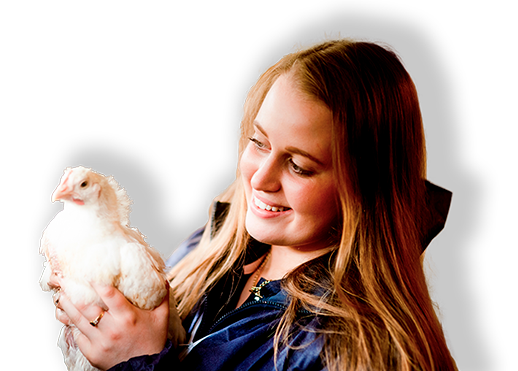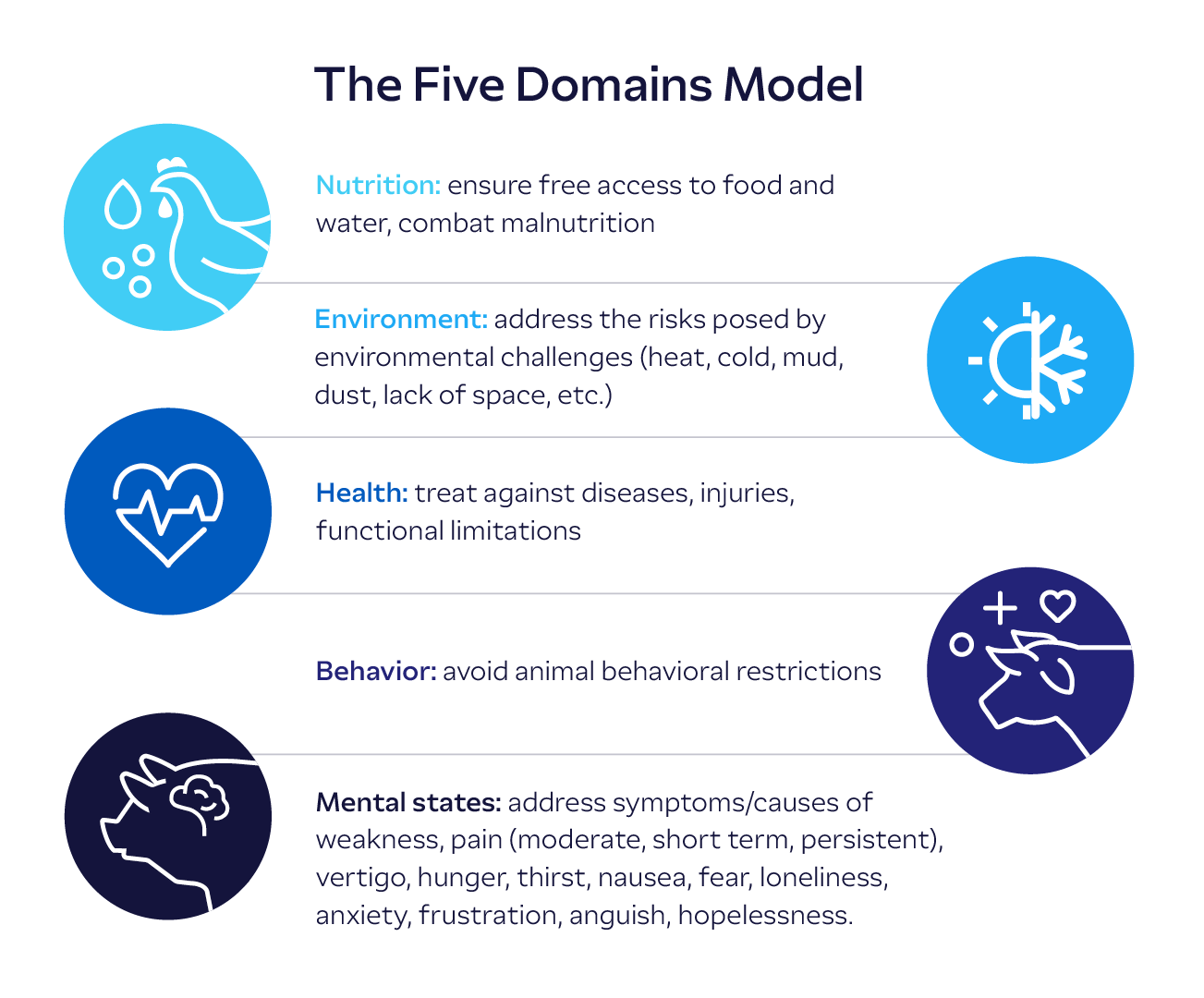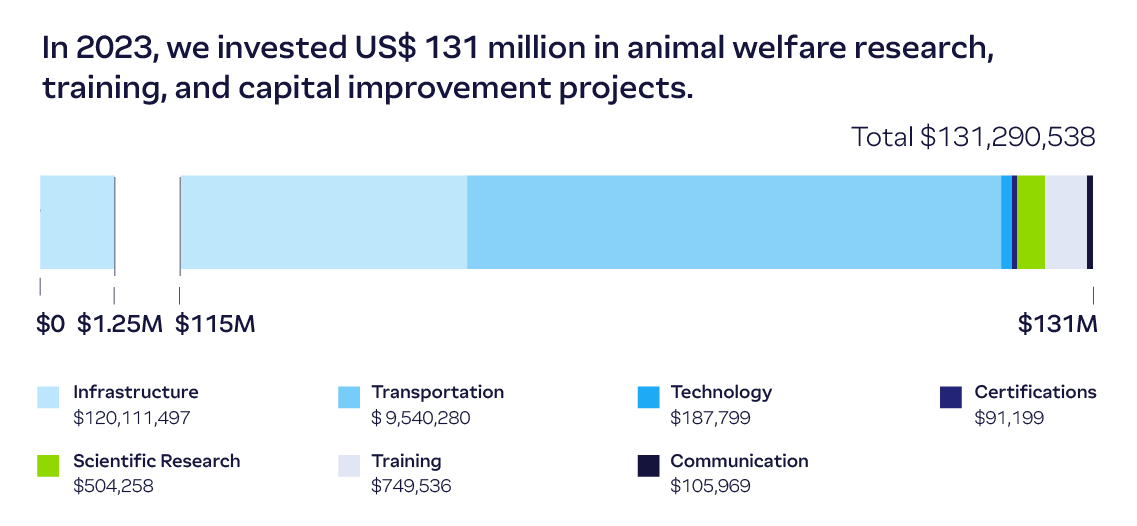Our Animals

As leaders in animal protein production, we have a serious responsibility to provide our animals with a good quality of life and a humane end. Across our operations, we have embedded animal welfare practices that demonstrate our respect for the animals on which our business depends. We have aligned our policies, including the JBS Global Animal Welfare Policy, and procedures with local laws and regulations as well as internationally recognized standards including the Five Domains Model, which is a framework for assessing animal welfare. The Five Domains Model is evolved from the Five Freedoms, a set of aspirational principles developed by the UK Farm Animal Welfare Council several decades ago, and it provides a more contemporary, measurable, and practical structure for companies to mitigate hazards and increase access.
We are committed to following animal welfare practices across our operations and supply chain to meet the needs of our customers, consumers, and society. Most importantly, we must demonstrate our respect to the animals on which our business depends.

Across our operations, our approach to animal care is grounded in science, measurement, training, audits, and research. Our animal welfare policies and procedures align with internationally recognized standards, local laws and regulations, and drive programs historically motivated by the globally recognized “Five Domains” developed by the UK Farm Animal Welfare Council.
Our Regional Approaches
Australia:
In Australia, all cattle and small stock that are consigned for sale are required to have a National Vendor Declaration (NVD), a document verifying Australian meat and livestock food-safety, as well as the...
Australia:
In Australia, all cattle and small stock that are consigned for sale are required to have a National Vendor Declaration (NVD), a document verifying Australian meat and livestock food-safety, as well as the product’s origin. In signing the NVD, the producer declares compliance with the Livestock Producer Assurance (LPA), an independently audited on-farm food-safety certification program. The NVD contains information relevant to the husbandry of livestock consigned for harvest. In addition, before cattle leave their farm of birth, they must be tagged with an approved National Livestock Identification System (NLIS) individualized Radio Frequency Identification (RFID) tag. This allows each animal’s movements to be recorded in a national database and provides the assurance of livestock trace-back to the property of birth and trace-forward from the property of birth. Sheep are required to have an ear tag visually identifying their unique property of origin.
Additionally, JBS Australia updated its Animal Welfare Policy to align to the Five Domains Model.
Brazil:
In Brazil, Friboi organizes campaigns, workshops, and seminars on cattle farms and sponsors programs to engage suppliers on topics related to animal welfare. For example, JBS technical staff prepares...
Brazil:
In Brazil, Friboi organizes campaigns, workshops, and seminars on cattle farms and sponsors programs to engage suppliers on topics related to animal welfare. For example, JBS technical staff prepares written materials on animal health and welfare, and the Animal Ecology and Etiology Research Group (ETCO Group) produces Good Practice Manuals, which have been sponsored and re-released by JBS.
In addition, one of the five modules of Friboi’s Fazenda Nota 10 program is Animal Health and Welfare, which consists of an online questionnaire for cattle suppliers. After a producer completes a questionnaire, they receive a detailed diagnostic report. Participating suppliers also have access to dedicated module classes, shorter topic-specific courses, technical support, and on-site visits.
Poultry and hog farmer partners supplying to Seara undergo stringent assessments for compliance with animal production practices, including animal welfare. Requirements such as facility layout, feeding technologies, and climate control are reviewed to determine animal health and status.
Canada:
In Canada we require all our partners who raise the cattle we purchase to be Beef Quality Assurance (BQA) certified, and we verify compliance through third-party audits based on...
Canada:
In Canada, we require all our partners who raise the cattle that JBS purchases to be Beef Quality Assurance (BQA) certified, and we verify compliance through third-party audits based on the BQA Feedyard Assessment.
Europe:
In Europe, of our Pilgrim’s Europe Chicken business’ poultry farms are Red Tractor approved and meet or exceed Red Tractor or equivalent welfare standards. Annually, an external auditor audits each farm to ensure...
Europe:
In Europe, all of our Pilgrim’s Europe Chicken business’ poultry farms are Red Tractor approved, meaning they meet or exceed Red Tractor or equivalent welfare standards. Annually, an external auditor assesses each farm to ensure Red Tractor standards, resulting in Assured Chicken Production (ACP) certifications following the audit. The farms are also visited and assessed weekly according to our Animal Welfare Program.
Our Pilgrim’s Europe Orléans business purchases beef for further processing and only sources beef from approved suppliers that are audited annually for food safety and animal welfare. Pilgrim’s Europe Beef Orléans also encourages its suppliers to purchase cattle from farms involved in Charte des Bonnes Pratiques d’élevage (Good Farming Practices) agreement, which was established by the National Livestock Confederation (CNE) and is considered the approved industry standard. Meat from the Netherlands and Ireland is also subject to the requirements set out by the Good Farming Practices, and this contributes to ensuring our 1,600 contracted farm partners are audited for animal welfare and environmental performance.
The Pilgrim’s Europe Pork business’ own higher welfare supply chain raises hogs at a minimum to the Red Tractor (pig) standard, and they are also afforded an additional level of welfare through the Royal Society for Prevention of Cruelty to Animals (RSPCA) standard, as well as our own British Quality Pigs (BQP) welfare standard. To that end, our Pilgrim’s Europe Pork business’ integrated suppliers are RSPCA approved by independent external auditors.
Pilgrim’s Europe provides the only fully dedicated lamb supply chain in the U.K., partnering with our network of 400 dedicated sheep farmers. All Pilgrim’s Europe lamb producers are Farm Assured and raise lambs to meet or exceed industry standards. Our standards are independently audited by Farm Assurance Assessors, and our lamb producer partners also complete a Responsible Efficient Production Assessment biannually. This assessment evaluates the farm’s production, health, welfare, and environmental standards.
Mexico:
At Pilgrim’s Mexico, poultry farms are visited and assessed weekly according to our Animal Welfare Program. During those visits, the farm staff checks...
Mexico:
At Pilgrim’s Mexico, poultry farms are visited and assessed daily according to our Animal Welfare Program. During those visits, the farm staff checks air quality, chicken litter, and feed. All our farms have the following certifications: Good Husbandry Practices (GHP), which are a set of rigorous standards whose purpose is to ensure the health of the animals, and Minimum Biosecurity Measures. The validity of these certifications lasts for 1 to 2 years respectively, and we ensure that they are renewed.
United States:
In the U.S., we require all our partners who raise the cattle and hogs we purchase to be Beef Quality Assurance (BQA) or Pork Quality Assurance Plus (PQA+) certified and verify compliance...
United States:
In the U.S., we require all our partners who raise the cattle and hogs we purchase to be Beef Quality Assurance (BQA) or Pork Quality Assurance Plus (PQA+) certified and verify compliance by conducting third-party audits according to the BQA Feedyard Assessment and the Common Swine Industry Audit (CSIA). Our sow and finishing farms are regularly assessed by field managers, veterinarians and our Director of Animal Welfare.
At Pilgrim’s U.S, poultry farms are visited and assessed weekly according to our Animal Welfare Program. A subset of farms are also audited by PAACO-certified auditors according to National Chicken Council (NCC) guidelines.
Please see Our Supplier Partners to learn more about the additional animal welfare requirements and certifications our suppliers must meet to be in our branded product programs.

Our animal welfare programs are often reviewed by animal handling and welfare experts from universities around the globe. In 2023, we established the JBS Animal Welfare Advisory Committee to provide vital oversight and guidance to our comprehensive animal welfare programs, aspiring to achieve the highest standards of care and well-being for our animals. This dedicated committee consists of seven respected university professors and researchers that specialize in veterinary medicine, animal handling and behavior, nutrition, epidemiology, and welfare. One of the primary aims of the committee will be to evaluate and establish a global companywide animal welfare goal for improvement.
